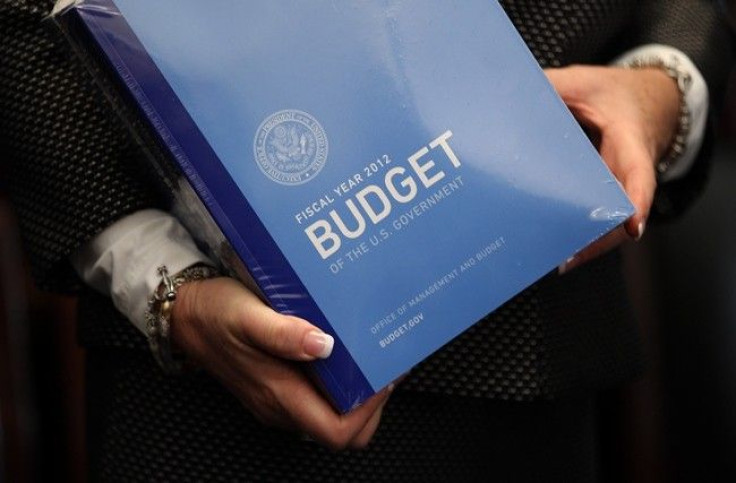U.S. Budget Battles: Avoiding March Shutdown, Tackling Long-Term 'Elephants'

Next Monday is just a week away, but the next big step in the battle over the 2011 budget has been taking shape ahead of the Senate's reconvenes on February 28.
The first step was taken over the weekend as the House passed $61 billion in cuts compared to the President's budget request.
The short term crisis which both Republicans and Democrats say they seek to avoid, is a temporary funding dry spell which would come about if they fail to agree on a spending law by March 4. The 2011 bill would fund the government with $1.2 trillion until September 30, the end of the 2011 fiscal year.
This battle will also presage the battle over the next several months about the 2012 budget, unveiled last week, which is filled with many parallels.
Congressional Democrats and President Obama are seeking smaller cuts than Republicans are.
For 2012, Obama has called for a $3.771 trillion budget, down $72 billion from his 2011 request. Meanwhile, due to higher taxes in 2012, the Obama budget will also run a $1.101 trillion deficit, about $544 million less than in 2011.
Republicans have vowed to present a 2012 budget at least by the end of march that they say will provide a sharp contrast with what the President wants.
In addition, Republicans have vowed to air out the long-term fiscal problems of the nation and make a proposal about how to reform the government's entitlement programs known as Medicare, Medicaid and Social Security.
Members of both parties have spoken about the need for tough choices. For Republicans, this means making big cuts to reduce the deficit while for President Obama and Congressional Democrats, that means keeping spending higher in certain areas such as education, infrastructure and research for science and technology in a bid to keep U.S. workers and businesses competitive over the long run.
Senate Majority Leader Harry Reid has defended the President's plan, saying the President's budget does not buy into the partisan talking point that there's no difference between spending and investing.
We don't have the money, Senate Minority Leader Mitch McConnell, R-KY said recently, in reference to Obama's 2012 proposal, which includes a 10-year outlook that McConnell also sees as borrowing and spending too much.
One area where Democrats are likely to seek concessions from Republicans in the 2012 budget is in special tax breaks for oil and gas companies, the insurance industry and the rich.
As the battle over spending sets up for the long term financial prospects of the federal government, however, the short term crisis is something that will occupy the Senators and Representatives in the coming weeks.
A similar crisis in the 1990s, where the government did shut down, meant some government services did not operate properly for several weeks.
When the Senate reconvenes on February 28, at the top of the Senate's agenda is most likely to be the House Republican-backed bill passed over the weekend that is filled with much more cuts than the Senate's Democratic Leadership seems willing to vote for and which President Obama has vowed to veto unless some of the cutting is reduced.
The Aviation Bill
In a message which highlighted bipartisanship in the Senate and attacked House Republicans for being extreme Reid pointed to the passage of an Aviation jobs bill last Thursday.
The bill received strong bipartisan support, and came ahead of the House vote over the weekend that cut more deeply in the 2011 budget than the Senate Democratic majority seems willing to accept.
The Aviation Jobs Bill is a good example of what we can accomplish when Democrats and Republicans work together, Reid said in a statement on Thursday. The bill passed by a vote of 87-8.
Reid said the bill would create or save 280,000 jobs and is a down payment on the jobs agenda Senate Democrats announced earlier in the week. He called the bill common-sense legislation that helps the economy and put Americans back to work.
In addition to jobs, the law, if enacted, is expected to reduce airline delays, protect passenger rights and update the air travel system with new technology.
It is fully paid for and won't increase the deficit a penny over its lifetime, Reid said.
Reid called out House Republicans, whom he said have focused on everything but jobs.
The bill the House passed on Saturday morning, if approved by the Senate and signed by President Obama, would fund the U.S. federal government from March 4 through September 30.
If the Senate and President fail to sign the bill, known as a Continuing Resolution because it funds the government at the same levels as 2010, some government services could shut down as federal employees will not receive pay or money to fund operations.
Reid warned of that scenario, focusing his comments on House Republicans, ahead of their vote.
Now they're saying they're willing to put Social Security checks for seniors, paychecks for our troops and funding for border security at risk by shutting down the government if their extreme demands aren't met, he said.
He said the country simply cannot afford these kinds of ideological, political games any longer.
© Copyright IBTimes 2024. All rights reserved.











